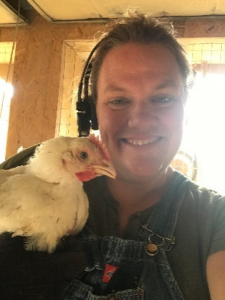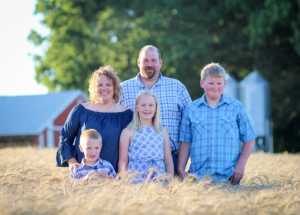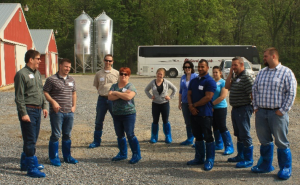To help celebrate Earth Day on Thursday, NCC spotlighted the sustainability story of Heather and Mike Lewis, poultry and crop farmers who run a 100 acre farm in Lancaster County, Pennsylvania. On their family farm, Heather and Mike grow corn, wheat, beans, and enough chicken to feed over one million people a year. They are super busy, but they still make time to focus on running an environmentally conscious and sustainable operation.
Last year, Heather and Mike’s exemplary commitment to environmental stewardship was recognized by the US Poultry and Egg Association when the couple was awarded the Family Farm Environmental Excellence Award. The prestigious award reflects the industry’s commitment to serving as responsible stewards of land, water, and feed management, and maintaining and advocating for the humane treatment of our most important asset: our chickens.
Interested in learning more about the industry’s innovations in sustainability? Be sure to flock over to our sustainability FAQ.
We shared questions on our Chicken Check In blog with Heather and Mike to help get a stronger idea of all of the incredible work they are doing on their farm and in their local community. You can find their inspiring responses below:
How did you get into chicken farming?
Heather: I did not grow up on a farm but in a farming community. During high school and a few years after, I went on the wheat harvest to cook. It didn’t take long for the love of ag to grow deep in me. After my time on harvest, I used to announce that if I didn’t marry a farmer, then I was going to be one myself. ???? Lucky me! I’ve done both.
Mike: I grew up in NY state on my family’s dairy farm. I went out west with a wheat harvest crew and then continued working for them in PA. The opportunity came to buy the farm we were living on. Knowing that I wanted to farm on my own, we worked hard to make the purchase happen.
Can you tell us more about your farm?
We farm about 100 acres of rotated corn, wheat, and beans, and have 3 broiler houses. Our kids are busy filling the old bank barn with 4H pigs and breeding sows for show pigs.
What drew you to farming in Lancaster County?
Lancaster County is rich in history and generational farms. We are thankful that we are able to start a farm here for our family. There are so many opportunities here for our kids as they grow, and it makes us excited to see what’s in store for them.
What inspires you to stay committed to running an environmentally conscious and sustainable farm?
To put it simply: our kids. We want to leave them with the ability to farm if they so choose. They are going to need a soil that is rich in nutrients and not running off into streams and rivers. They are going to need a way to produce more food for more people, with less space and resources.
Environmentally conscious, to me, means that we are aware of the impact our operation has on the environment, and how we can mitigate that impact while creating benefits to the environment around us.
Yes, we want to have a sustainable farm here, but it needs to be more than that. Every time we plant a crop, place a batch of chicks, or move a piece of dirt, we are looking at not only how we can sustain this operation, but how we can make it better for the years ahead of us.
Can you share more details about how you are implementing sustainable practices to help maintain nutrient rich soil and prevent erosion?
We practice no-till farming on our land to help prevent soil erosion as well as protect the nutrients that are in the soil. Leaving a crop residue on the ground and using a cover crop also helps to improve soil health. The years that we have corn in our fields, we save some of the fodder and grind it up into new bedding for the chickens. We also use recycled pallets for bedding. We bring a shredder in that has a large magnet on it, in go the pallets, out comes nice bedding for our chickens.
In 2016, we had the pleasure of hosting the EDC Finance And Ag Tour to our farm. The EDC (Economic Development Company) is a leading organization in Lancaster County designed to promote local business development. They have come along side of us helping to fund our newest chicken house. While familiar with the financials of the business, the staff was not always familiar with the everyday business of the projects they were helping to fund. It was so fun to be able to show them our operation and explain the everyday details, answering their many questions along the way.
Are there any other details we should be sure to spotlight about your farm’s sustainability practices?
We have a Nutrient Management plan that is written by a trained engineer/agronomist. They help us ensure that we are doing what’s best for our soil and the land around it. We windrow our litter between flocks letting it heat up to kill any pathogenic bacteria or organisms and equalize the moisture throughout. Then we reuse it, spreading it back out for an even bedding. When we do clean out, we try to annually, what we can’t utilize because of our nutrient management, is sold to a third party manure broker who sells it to the mushroom growers. PA is the leading grower of mushrooms in the United States!
We enjoy sharing our farm with others but have limited opportunities due to the need for biosecurity. We have participated with Pennsylvania’s Farm Bureau’s Ag Literacy Week, going into the schools and sharing with the kids our story of Agriculture. Over the years, we also participated with a neighboring farm as they hosted a farm visit for the 4th graders in our local schools.
What does operating a sustainable farm mean to you?
 Sustainability is a broad term related to agriculture. We need a sustainable income, an income that will support our next generation on this farm. We need sustainable resources, resources that will be available when and if our children or future generations decide they want to farm.
Sustainability is a broad term related to agriculture. We need a sustainable income, an income that will support our next generation on this farm. We need sustainable resources, resources that will be available when and if our children or future generations decide they want to farm.
Our community at large needs all of this to be sustainable, to ensure that we will have enough resources available to feed the world. The cycle that we get to watch and experience with poultry production is an exciting one. We start with a chick, on a bed of litter, that is from a recycled source. We raise the chick to become a healthy source of protein that can feed many people. The litter from that flock of chickens is recycled, used again and then eventually placed back on the field to raise corn that will be used in feed for future chickens as well as once again, becoming the litter. That is just one example of sustainability. Our goal is to not just sustain this farm and the land for future generations, but to implement practices that leave it even better than it is today. I never really appreciated Earth Day as much as I do on the farm.
What is your favorite chicken recipe?
Mike: Buffalo Wings!
Heather: A super easy and fast supper – chicken patty parmesan!
What is one thing about poultry farming you wish everyone could know?
One thing? That’s hard, there’s so much!
First of all, that we want what’s best for our birds! If they are not well and content, then we are not succeeding as growers. Our goal is to bring a healthy bird to a final product, so a healthy protein can be on your plate. The other thing that I have to mention is how many people it takes to make this industry succeed, including scientists, students, researchers, growers, feed mill workers, truck drivers, production workers, grocery store workers, and many others!
The U.S. chicken industry is committed to environmentally responsible and sustainable chicken production practices to ensure a healthier planet. Get more details about innovations in the industry on our sustainability page.



